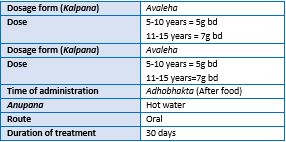A clinical study to evaluate the effect of Dashamoola Hareetaki Avaleha in Tundikeri w.s.r to Chronic Tonsillitis
DOI:
https://doi.org/10.21760/jaims.7.7.1Keywords:
Ayurveda, Chronic tonsillitis, Dashamoola Haritaki Avaleha, Mukharoga, Shothahara, Tundikeri.Abstract
Recurrent tonsillitis is commonly seen in children and this has many adverse effects on the normal growth and development of the child, missing of school days, economic burden of treatment etc. are few to name. About 30 million children develop tonsillitis with frequent exposure to bacterial and viral infections. The chronic tonsillitis wherein the tonsil gland gets inflamed and enlarged repeatedly, after treatment the size remains same though the inflammation subsides. This leads to obstruction in the throat both to airways as well as digestive tract. According to Ayurvedic classics, various internal medicines and procedures are advocated in the management of Mukharogas. In general, the drugs selected for treatment should have Lekhana, Shothahara, Pachana, Ropana, Rakthashambana and Vedanasthapana properties. One such polyherbal preparation is Dashamoolaharitaki Avaleha mentioned in Svayathu Chikitsa by Acharya Vagbhata, which is widely used in clinics for management of Tundikeri. In the present scenario scientific validation about the success of these treatments is required. Therefore an open label clinical study was designed to prove the effect of Dashamoolaharitaki Avaleha in Tundikeri. Materials and Methods: An open trial single group clinical study with minimum of 30 patients between the age group of 5 to 15 years with Tundikeri over a period of 30 days. Result: The clinical study showed highly significant results in relieving the clinical signs and symptoms of Tundikeri. Discussion: The Dashamoolaharitaki Avaleha was found therapeutically effective and safe to be administered in children and the mode of action was elaborated to substantiate the results.
Downloads
References
Khurana Indu, Khurana A. Textbook of medical physiology. Second edition. New Delhi: Elsevier; 2015. Section 1, general physiology; p.5
Randolph, G. J., Ivanov, S., Zinselmeyer, B. H., & Scallan, J. P. (2017). The Lymphatic System: Integral Roles in Immunity. Annual review of immunology, 35, 31–52. https://doi.org/10.1146/annurev-immunol-041015-055354
Tortora Gerard J. Principles of anatomy and physiology. 8th ed. Newyork: Harpercollins College Publishers; 1996. Chapter22, lymphatic system, nonspecific resistence to disease, immunity;p.679
Gupta Piyush, PG Textbook of paediatrics, chap 39.10. tonsils and adenoids, editor PSN Menon, Siddarth Ramji, 2nd edition, New Delhi: CBS Publishers & distributors; 2016: p. 1989
Pediatric medicine - tonsillitis in children (Internet). [Updated2 april2017, cited26 January 2021. Available from http://www.gponline.com/paediatric-medicine-tonsillitischildren/ear-nose-and-throat/article/1024856
Pediatric medicine-tonsillitis-children [homepage on internet]. Available from: http://www.gponline.com/clinical article/ 1024856/ Pediatric medicine-tonsillitis-children.
Dhingra PL Shruti dhingra.Diseases of ear nose and throat.5th ed. New Delhi: Elsevier Publications; 2010.Chapter 50,Acute and chronic tonsillitis; p.275-76
Acharya Jadavaji Trikamji, Agnivesha on Charaka Samhitha. Ayurveda Deepika commentary of Chakrapanidatta. Reprint edition. Sutra stana; Kiyantahshirasiyam: Chapter 17, Verse 34. Varanasi: Chaukambha Orientalia, 2020: p.99.
Murthy K.R. Srikantha,English translation on Astanghridaya of Vagbhata.Reprinted edition. Chikitsasthana;Vol 2. Swayathuchikitsa: Chapter17, Verse 14. Varanasi: Chaukambha Krishnadas academy, 2010: p. 459-60.
Sushruta. Susruta Samhita. Nibhandasamgraha Commentary of Sri Dalhanacharya & the Nyachandriaka Panjika of Sri Gayadasacharya(Edited by Vaidya Jadavji Trikamji Acharya & Narayan Ramacharya Kavyatirtha). Sutra sthana, 46th Chapter Annapanavidhi Adhyaya. (519) Reprint Edition. Varanasi: Chaukhambha Sanskrit Sansthan; 2010. p 252.
Bhavamishra. Bhavaprakash. Edited by Vidyoniti Hindi Commentary, Notes & Appendix by Sri Brahmasankara Mishra & Rupalalaji Vaisya. First Part. 6th Chapter, Mishraka Prakarana. (204) Reprint Edition. Varanasi: Chaukhamba Sanskrit Bhavan; 2013. p- 189.
Vagbhata. Astanga Hrdaya. with the commentarites Sarvangasundara of Arundatta & Ayurvedarasayan of Hemadri. Annoted by Dr Anna Moreswara Kunte, edited by Pt. Sadasiva Sastri Paradakara. Uttarsthana, 39th Chapter Rasayanavidhi Adhyaya (18), Reprint Edition. Varanasi: Chaukhambha Sanskrit Santhan; 2012. p-923
Bhavamishra. Bhavaprakash. Edited by Vidyoniti Hindi Commentary, Notes & Appendix by Sri Brahmasankara Mishra & Rupalalaji Vaisya. First Part. 6th Chapter, Mishraka (203) Reprint Edition. Varanasi: Chaukhamba Sanskrit Bhavan; 2013. p- 189.
Sushruta. Susruta Samhita. Nibhandasamgraha Commentary of Sri Dalhanacharya & the Nyachandriaka Panjika of Sri Gayadasacharya (Edited by Vaidya Jadavji Trikamji Acharya & Narayan Ramacharya Kavyatirtha). Sutra sthana, 42th Chapter Rasavisesha vijyaniya Adhyaya (10) Reprint Edition. Varanasi: Chaukhambha Sanskrit Sansthan; 2010. p 186.
Sushruta. Susruta Samhita. Nibhandasamgraha Commentary of Sri Dalhanacharya & the Nyachandriaka Panjika of Sri Gayadasacharya (Edited by Vaidya Jadavji Trikamji Acharya & Narayan Ramacharya Kavyatirtha). Sutra sthana, 42th Chapter Rasavisesha vijyaniya Adhyaya. (9/4). Reprint Edition. Varanasi: Chaukhambha Sanskrit Sansthan; 2010. p 185-6.
Agnivesha. Charaka Samhita. Revised by Charaka & Dridhbala with the Ayurveda- Deepika commentary of Chakrapanidutta. Edited by Vaidya Jadavji Trikamji Acharya. Sutrastana, 26th Chapter, Atreyabhadrakapya Adhayaya (42). Reprint Edition. Varanasi: Chaukhambha Prakashana; 2013. p.144-5
Murthy K.R. Srikantha, Vagbhata’s Ashtanga Hridaya text with English translation, notes, Appendix, Indices. Reprinted. Varanasi: Chaukambha Krishnadas Academy; 2010. Chikitsasthana; Vol 2. Chapter17, Swayathuchikitsa; Verse14.; p. 459-60.
Singh, R. & Ahmad, Moiz & Wafai, Z. & Seth, Vikas & Moghe, Vijay & Upadhyaya, Prerna. (2011). Anti-inflammatory effects of Dashmula, an Ayurvedic preparation, versus Diclofenac in animal models. Journal of Chemical and Pharmaceutical Research. 3. 882-888.
Meher, Sudhanshu & Bhuyan, G.C. & Das, Banamali & Panda, Purnendu & Ratha, Kshirod. (2018). Pharmacological Profile of Terminalia chebula Retz. and Willd. (Haritaki) in Ayurveda with Evidences. Research Journal of Pharmacology and Pharmacodynamics. 10. 115-25. 10.5958/2321-5836.2018.00023.X.
Reddy, Uma & Seetharam, Y.N. (2009). Antimicrobial and analgesic activities of Trikatu churna and its ingredients. Pharmacologyonline. 3. 489-495.
Meher, Sudhanshu & Bhuyan, G.C. & Das, Banamali & Panda, Purnendu & Ratha, Kshirod. (2018). Pharmacological Profile of Terminalia chebula Retz. and Willd. (Haritaki) in Ayurveda with Evidences. Research Journal of Pharmacology and Pharmacodynamics. 10. 115-25. 10.5958/2321-5836.2018.00023.X.
S.Ramgopal K, Ravi Kumar C. Critical review of herbs acting on Pranavaha Srotovikar. Int J Ayu Pharm Res [Internet]. 2015Dec.13 [cited 2022Apr.24];1(3). Available from: https://ijapr.in/index.php/ijapr/article/view/51
Tripati Brahmanand. Astanga Hridayam of Srimad Vagbhata. Reprint Edition, Delhi: Chaukhamba Sanskrit Pratishthan; 2009.chapter12. Doshabhediya.verse1.p171















